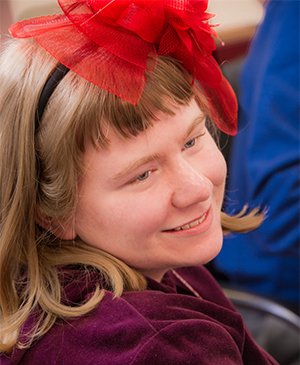I have pretty good recollection of who I sat with in the lunchroom during both my elementary and high school years, I can say with some certainty – and shame – that it wasn’t any kids with special needs.
So I was more than surprised to learn that not only are such relationships more common today, but actually encouraged through formal programs that foster a buddy system supporting students with difficulties tied to autism, Asperger’s syndrome and other social interaction issues.
And it’s a joy and wonder to behold, especially considering the way mass media arguably promotes an egocentric, narcissistic mindset when it comes to teens and their social milieu.
I was privileged to witness a shift toward something better at Grandville High School recently, where their version is entitled “Peer to Peer Program” and involves nearly 70 students sponsored by long-time educators Brenda Ott and Sheri Gilreath-Wats.
“It provides a great opportunity for kids with social interaction difficulties to learn in a natural setting,” says Ott. “If a student hears something from a teacher, sometimes it’s like” – and at this point, she goes “wha-wha-wha,” mimicking the adults as they’re portrayed verbally on “Peanuts” cartoon specials.
“But when they hear it from a classmate, a different kind of learning can take place.”
People with autism usually have difficulty understanding and/or expressing language and conventional social behavior. So it’s a godsend when someone is willing to invest time as they interact with others – and the typical schoolday is rife with those moments.
The Peer to Peer program is particularly evident in the lunchroom, where nourishment comes in many forms – not only from ingesting food, but creating and maintaining healthy relationships.
Freshman Maddie Remenap, for instance, chooses to be part of the program because it offers intrinsic rewards that go beyond the bonding: “I like to help others, and it’s a way to meet new friends,” she said between bites of grapes and a sandwich. “And it makes me feel accomplished – and glad that I made an impact on their life.”
“Classmate Jess Stanz feels similarly: “It makes me feel healthy and strong and great, every single time.”
The recipient of Jess’ help, Caroline Lam, smiles her approval, noting that Jess has “helped me experience some really good things,” adding that they share time not only at GHS, but on the same bus to and from school.”
For students Cameron Snoap and Jacob Kenny, the program has morphed into something extraordinary – a chance to become by both boys’ admission “best friends.”

“We’ve known each other since we were in elementary school at Cummings,” says Jacob, “and realized we had a lot in common.”
They both run cross-country. Both enjoy zombie-themed shows and attractions. Both like the same sort of entertainment and music. Plus, they work well together.
For a school economics project, Cameron designed the logo for a phantom coffee business, while Jacob wrote a rap song to trumpet their creation.
In the lunchroom, Cameron encourages Jacob to unveil a new song he’s working on, and he proudly shows me the lyrics to “Be My Baby Girl,” and then without prompting, sings it, completely unabashed.
“Hey girl over there/ I got something to say to you/ I kept it in for a while now/ But when you hear it, I hope you feel the same way, too…”
Cameron beams. Though it wasn’t always this way. “I used to judge Jacob,” Cameron acknowledges. “I used to make fun of him. Back in elementary school, I had this ring that was like a fake finger with a nail through it, and it used to freak Jacob out. I was teasing him back in the day.”
Jacob nods. “People used to tease me,” he says. “I would get seriously emotionally sad. I wondered if I was a nobody. I mean, we’re all trying to find out who we are, and what we’re supposed to do, right?”
The epiphany for Cameron came one summer several years ago when at a camp, someone started teasing him about having Attention Deficit Disorder. “I had a friend who stuck up for me,” he remembers, “and it was then I realized that Jacob was not so unlike me.”
Jacob concurs with another nod: “Everybody has problems.”
For sophomore Rachel Veenkamp, being a part of Peer to Peer allows her to practice her sense of patience and exercise her communication skills with classmate Tori Waite, who on this particular morning is not especially verbal.
“Some days are better than others,” says Rachel, “so I’ll keep my questions to a minimum. But we play Candy Crush together. And we sit at lunch together. And we see each other in the halls, and walk each other to class. And some days, that’s enough.”
Brenda Ott points out that students in the program learn adaptive ways to communicate with their counterparts. “Sometimes, you need to use an I-pad, or write things down to one another,” she says of students not given to speaking in a traditional sense.
Other times, students must be prepared to deal with what’s know as “perseveration,” which is a person’s uncontrollable repetition of a word, phrase or gesture, usually caused by brain dysfunction or other organic disorder.
Issues like that are addressed in regular meetings designed to acquaint students with strategies to employ and reinforce meaningful communication.
But Peer to Peer has a special place in her heart, and has helped her develop “the courage to speak up for others” when they can’t or won’t.
“Peer to Peer isn’t just about having friends and socializing,” she says. “It’s about how to make a friend.”









